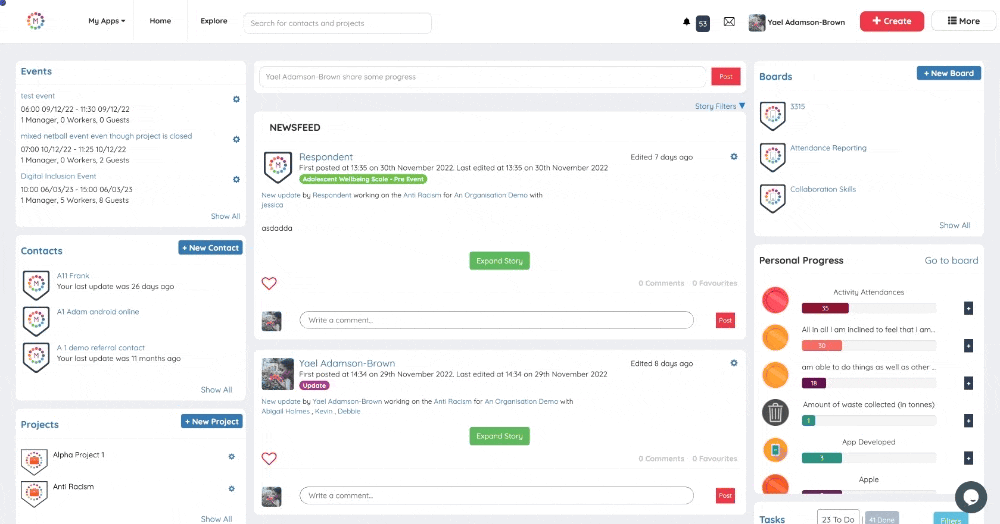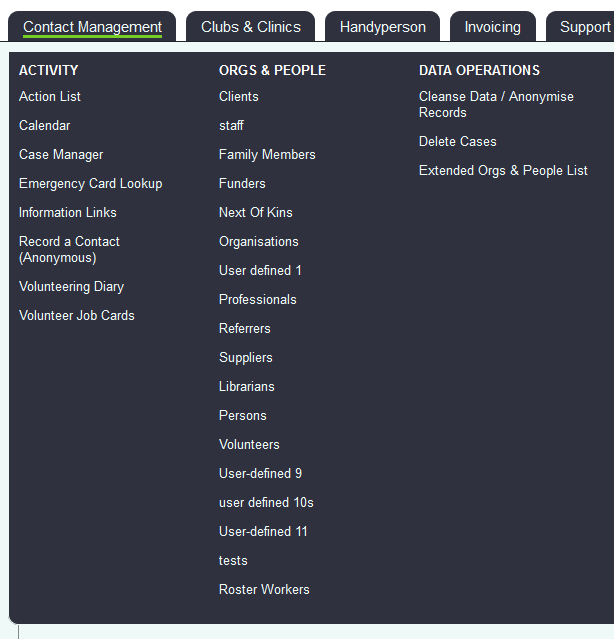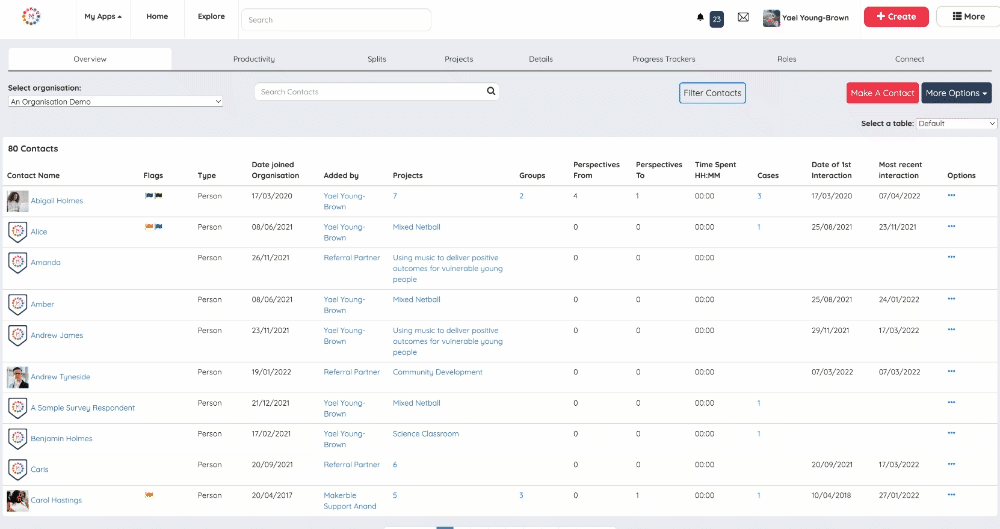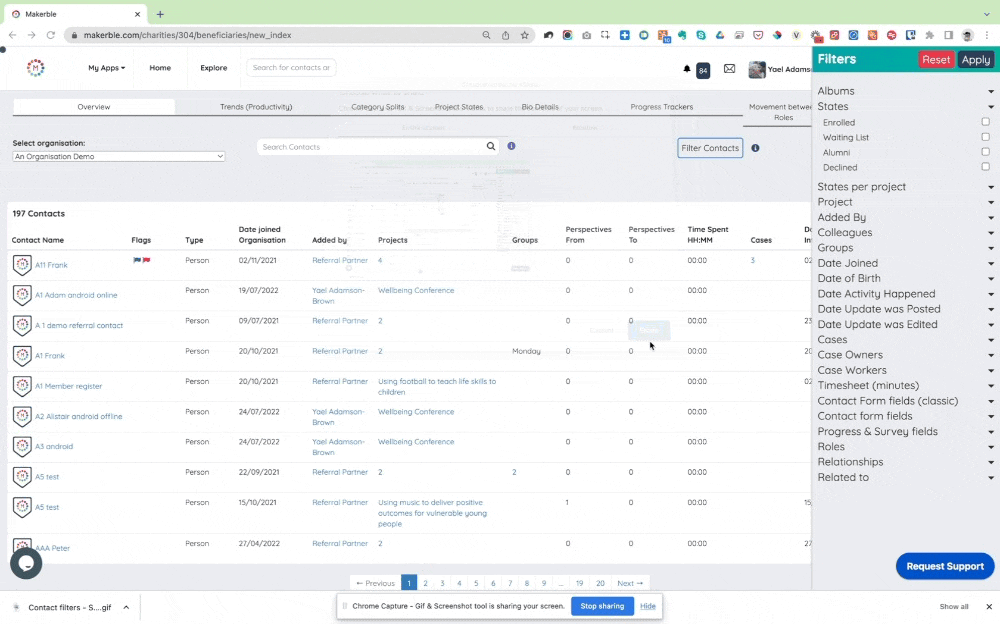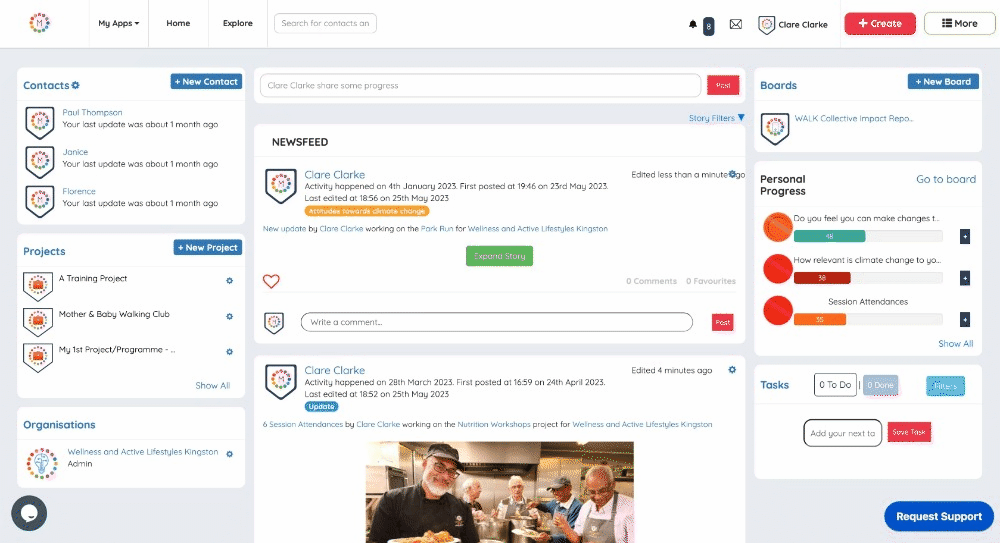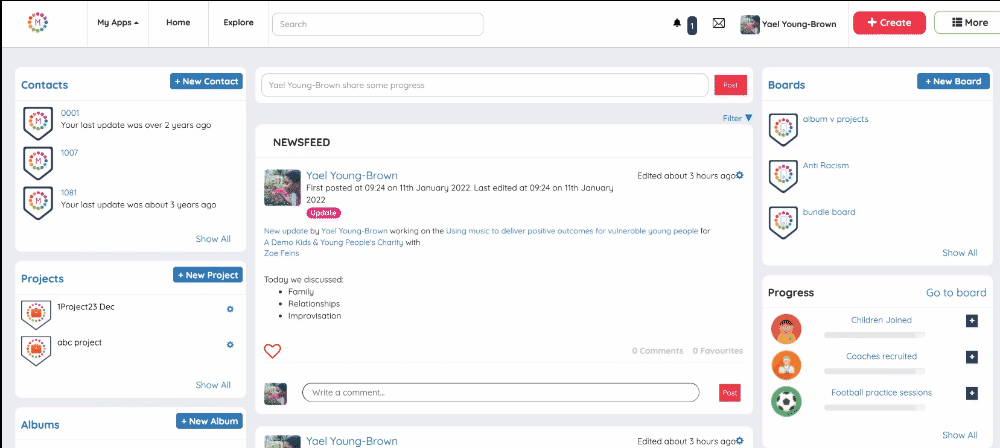With our new "Access Alerts" feature, you can effortlessly manage your alerts just by clicking on the hyperlinked text “Alert”, in blue, present in the Alert icon. This will lead you to the Manage Alert page where you can see the name of the alter trigger, check the time and date that the Alert was created, see the name of the user who resolved that Alert, and check the time and date that the user marked the Alert as Resolved. It’s all just a click away.
3 Reasons Why Juggling Several Systems Puts Your Nonprofit At Risk
New Feature Releases this week (24-28 July 2023)
Why SHiFT and their local authority partners chose the Makerble charity case management CRM
SHiFT partners with Youth Offending Teams embedded within Local Authorities to change the way they work with the hardest-to-reach young people. While their work has gained national recognition, their operations slowed them down. Reliance on paper records and spreadsheets meant that quarterly reporting of outcomes from survey responses was tedious and time-consuming. Makerble CRM is a simpler, faster and far less stressful solution.
Advance Brighter Futures uses Makerble to schedule, manage and evaluate Talking Therapies
Advance Brighter Futures is a mental health charity in Wrexham. Their focus is not on medical treatment or therapy, but on improving the quality of life of their beneficiaries. They help individuals experiencing mental health problems build a meaningful and satisfying life. They promote health, wellbeing and recovering, and ensure that no individual feels like they are on their own.
CHALLENGE
Their old system was holding them back from growing because it was so difficult to use. It was unnecessarily complex and they found themselves looking for awkward workarounds to get their work done.
They had been using Charitylog to manage their work previously.
Producing monitoring reports was a lengthy process that took several people, several days to complete.
HOW THEY USE MAKERBLE
They have created digital referral forms which are shared with professional referrers in their network and also posted on their website. This means they can receive self-referrals as well. All referrals go straight into the Advance Brighter Futures system, which frees up 5 to 6 hours of admin work each week.
All the information relating to one person is all in one place, so it is available at the staff member’s fingertips. This way no information gets overlooked and staff can provided the best possible service to each individual beneficiary.
Staff can leave comments on other people’s work and keep track of everyone’s work.
The team can quickly identify case studies to include in funding bids because anecdotes are easy to record on Makerble and tag to the client they relate to. This is allowing Advance Brighter Futures to tailor the case studies they use to the specific requirements of their funding bids.
IMPACT ON THE ORGANISATION
We asked Advance Brighter Futures what the impact of using Makerble has been. This is what they said:
Staff and volunteers are more independent. This also frees up time for supervisors because it’s easier for the team to administer and manage their own projects
You can see everyone’s work in one system, which eliminates duplication. This saves time and decreases the chance of human error.
Progress and impact is represented in a helpful visual way, which is useful on two counts. It helps to show progress to funders. Also, it helps to show personal progress to beneficiaries, so that they can easily see and appreciate their own journey.
As it is so much easier to assemble the information needed for reports and funding bids, their monitoring time has decreased by at least 50%
The fact that staff are now responsible for the data input on their own projects (rather than an administrator) has made staff more emotionally invested in their projects. They can see their progress, which gives them a boost and makes them feel that they’re making an impact.
It’s easier to see the impact and therefore easier to sing praises about the impact. The staff felt they were making a difference before, but they didn’t always have the data to prove it. Now they can prove it to funders, to themselves, and to their beneficiaries.
Vintage Vibes use Makerble to simplify their daily operations and reporting
Christians in Sport nonprofit Impact Data Visualisation case study
Christians In Sport were struggling with their ThankQ CRM. It was hard to use and didn’t provide the impact reporting functionality they needed for their next phase of growth. Christians In Sport worked with Eido Research to create an impact strategy and together they chose Makerble as the software platform to manage the charity’s impact data across its national and international programmes.
CAG Consultants & Climate Action Leeds collective impact CRM case study
CAG Consultants are leading the evaluation of the Climate Action Fund for The National Lottery Community Fund. They are also the evaluators working with Climate Action Leeds. They needed a platform that gave them the ability to collect qualitative and quantitative impact data as well as the flexibility to adjust their impact measurement framework over time.
Being Iterative: how to be led by results, not processes
Organisations depend on processes - they are now we define the way we do things.
If this, then that, then this, then that.
As a team our processes live in two places
- the "Playbooks" (policies, documents, briefs) we produce for each area of work that's done. These usually explain how to do tasks in the most efficient way possible.
- the systems we use, for example, trello boards that visualise the process by having lists for To Do, In Progress, Amends Required, Done.
As a startup, some of our processes have been tried and tested; we know that they work and they are therefore the way we want to do things going forwards.
Other tasks are experimental. We know what we want to achieve but we don't necessarily know the best way to get there. In these scenarios we want you to be experimental. Other words for this are Lean or Agile. It's about doing things as quick experiments so you can test with a small sample and then iterate or continue or expand.
Let's look an example. Imagine your task is to bake 5 cakes at Makerble but we have never baked cakes before. In our playbook we might say that the process is (1) mix the ingredients, (2) put in oven, (3) add icing decoration to the top of the cake. If you worked in a large company and you were just a small cog in a big machine, you would probably start by doing stage 1 for ALL 5 cakes. And you would do all the mixing first. Then you would put all five cake mixes into the oven at the same time. Then you would decorate all the cakes at the end. This is an EFFICIENT approach and it is fine to do this when you know exactly how to achieve the task. I.e. the process has been tried & tested. But in a startup we have new ideas all the time and as we've said, we've never made a cake like this before. So actually what you should do is follow the process from start to finish but for only ONE cake at a time. that way you can see the result of following the process from the first cake, and then you can iterate by amending the process slightly for the second cake if you need to. By reviewing the results of each cake you bake, the next cake will become better and better. This is how startups use iteration to constantly improve and it's one of the key principles that separates Startup culture from Big Corporate culture.
What are outcomes and why are they useful?
Lamplight alternatives: Makerble versus Lamplight
Usability
On of Makerble’s current clients previously used Lamplight. They switched to Makerble because they found Lamplight’s UX to be clunky and not intuitive, and thought it uses less understandable terminology.
Makerble, on the other hand, is modelled after social media platforms. This means that most staff and volunteers find it easier to use than other platforms because it already feels familiar which makes it more intuitive to navigate.
Lamplight only offer 1-way SMS messaging. Makerble allows you to send a receive SMS messages and emails all on the same platform.
Lamplight does not have an offline mobile app. Makerble’s mobile app allows you to continue data collection on the go, if you are doing work out in the community, for example. Being able to access Makerble offline and on the go had been particularly helpful for our clients that work in remote areas.
Data collection and reporting
Lamplight allows you to create and send out surveys, but you have to create all your surveys from scratch. You can also create your own unique surveys on Makerble, but we save you time by having a library of frequently used surveys from a range of industries available to use.
Both on Lamplight and Makerble you can create visual impact reports. But only Makerble has built in functions that help your impact be seen. For example, once you’ve created an Impact Board you can embed it on your website and add a donation button. This allows donors to see specifics about your impact.
Salesforce alternatives: Makerble versus Salesforce
Platform design and usability
Salesforce is designed to drive sales, not measure impact, so the terminology of the platform is not appropriate for beneficiary management. This means that you have to fit yourself and your work into the existing shape of Salesforce, where as Makerble is built and set up to fit you.
It also looks and feels like a CRM system, which can be hard for volunteers to navigate. Makerble is designed to look like a social media platform. Each contact has a self-contained “profile page”, so it is easy to access all the relevant information about a beneficiary, which ensures that you are providing them with the best possible service and assistance. There is a newsfeed where colleagues can post updates for each other. It is also a helpful place to document any anecdotal evidence about your programmes.
This social-media-like design means most people are already quite familiar with that sort of interface and can navigate it intuitively. But if some staff still struggle Makerble has a very comprehensive user guide with step-by-step instructions and videos detailing every function on Makerble.
Data collection and reporting
Whilst Salesforce does have the function to create visual impact reports using your data, on the data collection side it does not provide the same level of support. Makerble encourages comprehensive data collection throughout your programme’s lifecycle, and has a library of templates, metrics and surveys to help you along the way, as well as free information resources available to everyone.
Charitylog alternatives: Makerble versus Charitylog
Usability
A current Makerble client switched to Makerble after using Charitylog. One of the reasons they decided to make the change was that their staff found the data entry process tedious while using the Charitylog system and in their experience the interface was not very intuitive. The process of training their staff to use Charitylog was time-consuming and they found that it took their staff a long time to become familiar with the platform.
On charitylog…
An example of a screen on charitylog
On Makerble…
Makerble is designed to feel familiar from the get-go so that the time required for training is low. When you login you’re welcomed by a Newsfeed that is similar to a social network. It shows you a snapshot of the latest activity that’s happened with the contacts (clients, beneficiaries, stakeholders, etc) that you work with.
Charitylog has several useful features but some users have found that many of those features are hidden away in text-heavy menus that make it difficult to find your way around. The image below is an example of a charitylog menu.
An example of a menu interface with charitylog
Makerble has a bright and visual interface that is designed to feel welcoming to people who aren’t confident using databases. Information feels easy to access thanks to interactive menus and reporting that’s available in a couple of clicks.
Impact measurement
Charitylog is a provider of database software. If you want to improve the way that you measure your programme’s impact, you might find that Charitylog doesn’t have the expertise to provide you with advice on surveys, outcome frameworks or Theories of Change you can use to better achieve your outcomes. By contrast, Makerble has a library of impact surveys, outcomes, indicators and logic models that you can add to your projects in a couple of clicks.
Makerble has a library of surveys that are ready for you to use across your projects, programmes and services
Future-proofing
Some organisations have found that Charitylog is not future-proof. If the work you do is likely to remain very much the same over time, then charitylog may well be sufficient. But if you’re expecting to gain new funders (who have additional reporting requirements), launch new programmes (which require additional forms) or change the way you work over time (e.g. adding automations to reduce repetitive tasks or integrating with other software you use), you might find that you start to encounter Charitylog’s limitations.
Makerble is easy to adapt. You can create new forms, add new fields and apply those forms to new or existing projects. The library on Makerble shows you all of the fields you’re using and the forms which they appear on. This helps you avoid duplication and means that as your organisation grows in complexity, your system is able to keep up.
Reporting
Charitylog provides limited visual reporting, comprising mostly of lists and tables.
Example of a report from charitylog
Makerble is designed to give you quick access to your data. There are interactive filters that let you specify the results you want to see
On Makerble you can filter your results by almost any datapoint on your platform
Makerble lets you easily create custom tables that let you customise the datapoints you want to display in a table.
The purpose behind Makerble is to make people feel proud of their impact. That’s why the Makerble is full of progress, charts and interactive dashboards. The intention is to inspire users to explore their results for themselves and learn from them so that they continually improve.
Reporting dashboards on Makerble are interactive which inspires users to explore data for themselves and reflect on their results.
Charitylog provides database and case management software. If your staff are adept at using databases and if you’re work is unlikely to evolve over time, charitylog could prove to be a great solution. Whereas if you have some staff and volunteers who aren’t expert at database systems and if you’re planning to grow, Makerble is likely to be a great partner as you scale.
5 Reasons Not-For-Profits Are Using Distance Travelled To Measure Their Impact
Makerble's impact evaluation of the HEAR Networks NetEquality project
In 2021 Makerble wrote an impact evaluation report for NetEquality. NetEquality is a programme funded by the National Lottery Fund and delivered by a group of charities with HEAR Network as its lead partner. NetEquality’s is to explore and develop new digital ways for equality organisations to collaborate.
There are hundreds of grassroots organisations in London that support and advocate for marginalised people who experience inequality in some way. Many of these organisations are under-resourced, and while they occasionally collaborate with other organisations, typically they work independently and disparately, thus not reaching their full potential. The purpose of NetEquality is to remedy that.
The NetEquality partners had been exploring the idea of “netmapping”, a way of visualising data to display connections between entities. Early feedback from equality groups was that they were interested in the idea of visualising their connections but they found the netmapping software difficult to use.
Makerble’s evaluation sought to answer the question: How could the NetEquality programme create greater impact? To understand the impact of the programme we conducted interviews with partners and people from grassroots equality-focused organisations.
We found that people’s experience of NetEquality was overwhelmingly positive and there were no explicitly negative comments made at all. The main benefit seemed to be simply bring together people who are passionate but often working alone or against the “system”.
The main specific NetEquality work respondents spoke about was the netmapping tool. People had mixed experience with this. Many thought that a shared up to date information resource was a wonderful idea but had plenty of queries about the reality of the process to built the resource and the tools they had seen up to that point. The biggest issue that was brought up was accessibility.
The partners were excited about the idea of helping their members work together to pursue equality and some emphasised that this would be a long-term project and an iterative building process. However, the project seemed to lack a clear sense of direction, as evidenced by the absence of a theory of change.
Makerble made a series of recommendations on how NetEquality could further its impact in the future, from taking on board feedback on creating a more user-friendly tool and bringing in product development expertise, to truly accepting the iterative process of development and embracing the work-in-progress editions of the netmapping tool.
Makerble's report on Moving On Up Collective Impact Partnership
In 2021 Makerble wrote an evaluation report on Moving On Up Collective Impact Partnership. Moving On Up is a programme funded by Trust For London and City Bridge Trust, with support from the Black Training & Employment Group (BTEG).
The concept of Moving On Up rests on the idea that improving employment outcomes for young Black men is not something that any one organisation or fixed set of partners can achieve alone. The challenge requires a collective approach in which organisations work together in ways they have never done before. That is the essence of MOU’s Collective Impact Partnership. While the organisation has other strands of work, the focus of Makerble’s evaluation was their Collective Impact work.
The Moving On Up programme operates in two boroughs, Brent and Newham, by bringing together BTEG staff, local authorities, and voluntary, public and private sector organisations.
The evaluation answered two key questions. Does the collective impact approach improve employment outcomes for young Black men? And, could the collective impact approach be applied to other target groups and in any geographic location?
Makerble found that some young Black men participating in Moving On Up’s programme had a better journey into employment than they would have done otherwise, as partners are sharing training and job opportunities with each other, which is unlocking a series of benefits for their programme participants. Moving On Up is also helping young Black men feel more encouraged by giving them access to a wider range and volume of opportunities. Respondents said they felt encouraged even when a job opportunity does not work out. Overall the participants tended to see a real distinction between Moving On Up and other organisations, some particularly appreciated that Moving On Up offered personalised support, was caring, and supplied better jobs than they were able to obtain through job brokerage service alone.
Also, the partner organisations felt that funders were more interested in the success of the programme overall rather than the performance of individual organisations. Organisations that used to compete for funding were now collaborating and discussing funding opportunities with each other.
Makerble’s report made recommendations for future improvement. You can read the executive summary here.
Down Syndrome International have joined Makerble
Down Syndrome International are a UK based disabled people’s organisation, made up individual members and member organisations from all over the world. They work to improve the quality of life for people with Down syndrome, promoting their right to be included on a full and equal basis with others.
They run global campaigns and events advocating for the rights of people with Down syndrome and participate in international disability and human rights forums. They work with their partners to provide accurate advice and support on key issues affecting people with Down syndrome around the world, like policies and practices on education, healthcare and human rights. They also develop and grow their membership network, helping to build alliances and networks of self-advocates and families.
TREAD have joined Makerble
TREAD is an organisation based in Washington State, USA. They were established to bring together more than 50 partners that work to enhance and protect the region’s outdoor recreation. Before TREAD was created there were a multitude of organisations and programmes providing outdoor recreation opportunities for the community, but their effort lacked coordination. Now TREAD works with these organisations to find creative solutions for sustainable trails, diverse partnership, community leadership, and economic development, focusing on achieving sustainability and accessibility.
With their view of their 50+ partners TREAD are in a unique position to see the intersections and needs of those organisations. So, they can leverage their relationships to efficiently fund, plan, and execute projects, spanning over up to 20 years.
Receive Referrals Without Doing Any Data Entry
If the process of receiving new referrals requires you to type up people’s information into a spreadsheet or database, your systems are letting you down. Your time is too valuable to be spent copying and pasting information from one place to the next and doing mindless data entry. The good news is that Makerble Signup Forms take all the work out of your referral process so you can simply share a link to your form and then see the Profile Pages of those people as soon as the form is completed.
Use Stories to Evaluate Programmes
When you run a nonprofit organisation you and your colleagues get told time and again how much of a difference you’re making to people’s lives. But where do you keep hold of that valuable information?
What often happens is:
Stories get lost or forgotten in the busyness of running an organisation.
Great quotes and powerful testimonials only exist in emails, feedback forms and WhatsApp messages
When interviews and case studies are written up, they’re stored as Word documents which only certain people have access to, meaning that your organisation doesn’t get the full benefit of those stories
There is a better way
If any of those things have happened to you, you could benefit from using Makerble Stories to record, store, share the difference your organisation makes.
Capture the magic of each moment, right when it happens, instead of waiting several hours or days later
Upload pictures directly from your phone or tablet
Record audio clips
Capture anecdotes, stories and feedback from the day’s activities in the community you serve
Categorise your stories into evaluation themes you can report on
Create as many Evaluation Themes as you like - each one is saved as a label
Add one or more Evaluation Theme labels to each story
Report on all the stories that demonstrate an Evaluation Theme by simply selecting that label



















